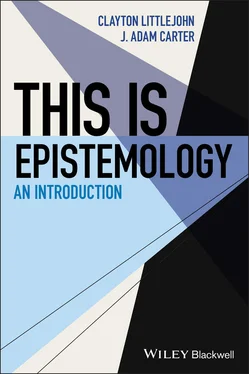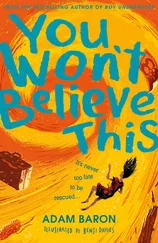1.67Now, you might wonder about the argument's starting point, P1. In this discussion, it was assumed by all sides that some belief could be justified. And so the Regress Argument for Foundationalism simply tries to trace out an implication of this non‐skeptical assumption. Thus, the Regress Argument shouldn't be thought of as an argument against skepticism. Rather, it should be thought of as an argument that purports to show that there must be two kinds of justified belief if the skeptic is wrong and some of our beliefs are justified. We'll be discussing the viability of skepticism in more detail in Chapter 11.
1.68The Regress Argument is not, it should be noted, the only viable rationale for foundationalism. A second rationale is a kind of argument from cases. 34 When you think about beliefs about how you feel right now (tired? sad?), what you're trying to do or what you're doing (reading? tapping your feet?), what you're thinking about or imagining (epistemology?), or what the sum of two small numbers is, it is very difficult to imagine what propositions you'd have to rely on to justifiably form a belief about these matters. If you're typing (or trying to type), it seems you can know that that's what you're up to “straight off,” in the sense that you form these beliefs, seemingly unimpeachably, without first explicitly considering other things. What evidence would you appeal to in order to justify your belief that you are trying to type?
1.69It seems that in these kinds of cases at least, you can simply tell that you're tired or sad, that you're trying to type or tap your feet, that you're thinking about epistemology, or that the sum of two twos is four. If pressed, you could offer some sort of argument in support of these claims, but the idea that you ran through such an argument (consciously or not) in order to form a reasonable belief about these matters seems to misrepresent your epistemic position. Maybe your friend would have to consult some evidence to decide whether you were typing in your office or trying to type (e.g. gather witness statements, listen for the clicking and tapping, etc.), but your situation is very different from your friend's if you're the one trying to type. Similarly, you might try to gather evidence to determine whether you are tired; but wouldn't this be in a sense superfluous? Can't you just think about it and work it out without having to argue from some further assumptions about how red your eyes are or how much sleep you had the night before?
1.70To understand the foundationalist's proposal, an analogy should be helpful. Consider this sudoku grid: 35
|
3 |
8 |
7 |
9 |
2 |
5 |
1 |
|
|
6 |
9 |
4 |
|
1 |
7 |
|
|
| 2 |
|
|
|
|
|
4 |
|
|
|
|
4 |
|
1 |
|
|
6 |
|
| 9 |
1 |
|
|
|
|
|
8 |
7 |
|
2 |
|
|
8 |
|
1 |
|
|
|
|
|
|
7 |
3 |
|
|
1 |
|
|
7 |
1 |
|
|
2 |
9 |
|
|
4 |
3 |
|
6 |
9 |
8 |
7 |
|
1.71Some of the boxes you start with will be empty. Some will already contain a number. The boxes that contain numbers from the start are given. You don't need to engage in any sort of reasoning to know that it's a 3 that goes in the second box from the left in the top row. That box is given to you for free. So are all the other boxes that contain numbers. The only rational basis for adding more numbers to the grid will derive other numbers from the numbers given. If there is no reasoning that is available to you that takes you from the numbers given to some conclusion about what number to put into an empty box, you simply cannot know what goes in there and cannot justifiably judge that some number gets in there. If nothing is given to you for free, you simply could not have any justified beliefs about what number would go where.
1.72The foundationalist thinks that something similar is true when it comes to the justification of any belief. Without non‐inferentially justified beliefs (i.e. givens, or freebies, if you like), you couldn't rely on reasoning to provide you with any justified beliefs. The rational support for any justified belief has to trace back to the support provided to a non‐inferentially justified belief. (In the limiting case, that belief will itself be one of the non‐inferentially justified beliefs.) Happily, the foundationalist says, we do have some non‐inferentially justified beliefs. They are justified even if we cannot find support for them in other justified beliefs we have, and they are the foundation that accounts for all the derivatively justified beliefs we form by reasoning well from these starting points.
1.6 Objections to Foundationalism
1.73It might be useful to think about how far we can push this analogy, because it will help us see why many philosophers have been critical of foundationalism, and help us see how foundationalists should respond to this criticism in fleshing out their view.
1.74Thus far, foundationalism – as we've stated it – is a purely structural proposal. It says that (i) every chain of justified beliefs must include at least some non‐inferentially justified belief and (ii) every inferentially justified belief must derive its justification from non‐inferentially justified beliefs. If this view is correct, nothing gets into Your Book of Justified Beliefs unless it derives its justification from another justified belief via inference or is non‐inferentially justified and derives its justification from something other than another belief. We haven't yet said anything substantive about the nature of these non‐inferentially justified beliefs, because we haven't said what these beliefs are about, what supports them, or how what supports them ensures that they have the right properties to be justified.
1.75While the sudoku analogy can help us understand the sort of structure that the foundationalist thinks has to be in place in order to have justified beliefs, it does highlight one of the features that some critics of foundationalism find objectionable. In sudoku, the given entries that serve as the foundation for all subsequent thinking about the puzzle are beyond rational scrutiny and cannot be revised. (The given entries are simply there , in sudoku, and it's built into the game that there's no room to doubt them.) Does the foundationalist really think that the foundation for all our thinking about the world rests on foundations that we have no room to doubt? Thinking that such beliefs are in short supply, critics of at least one version of strong foundationalism could argue as follows:
Argument from Defeasibility
P1. If there are non‐inferentially justified beliefs that are like the numbers given at the start of the puzzle, then you cannot form correct beliefs about the world by reasoning well from your justified beliefs in such a way that you're led to suspend judgment about whether one of these properly basic beliefs is true, and you cannot form the correct beliefs about the world by reasoning from your justified beliefs to the conclusion that one of these beliefs is false.
P2. However, none of our beliefs are immune to this sort of process of rational revision.
C. Thus, it isn't true that there are non‐inferentially justified beliefs that are like the numbers given at the start of the puzzle.
Читать дальше












